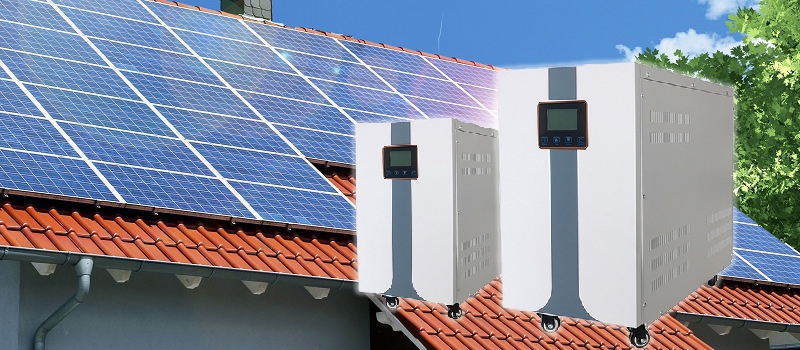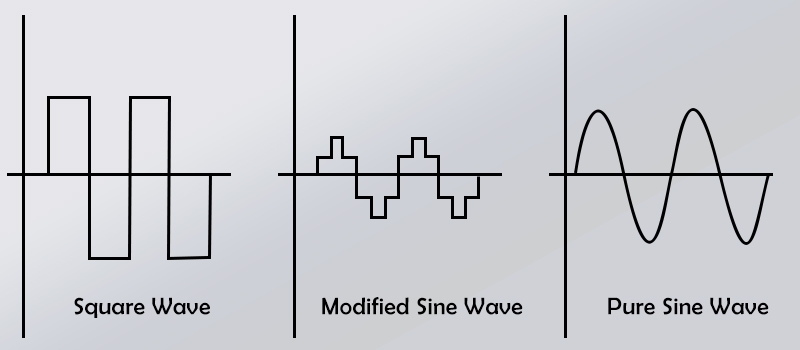Selecting an off-grid inverter is an important part of designing and building a solar energy system. As one of the core components of a solar system, the inverter is responsible for converting the direct current (DC) collected by the solar panels into alternating current (AC) for use by electrical and household appliances. The right inverter plays a crucial role in improving energy conversion efficiency, ensuring system stability and extending the life of the components. This blog will detail the key points and considerations for choosing a solar inverter for your PV off-grid system from a number of perspectives, in order for it to better power your home.
Matching of Parameters with Other Devices
The solar inverter is part of the solar power system, so when shopping for one, make sure that it is compatible with the other equipment in the system to prevent safety incidents. The parameters to pay attention to are:
Power
The power of the off-grid inverter should match the power of the solar panels. In general, the power of the inverter should be slightly higher than the rated power of the PV panels to ensure efficient conversion. For example, if the solar panels are rated at 200W, then an inverter with a power of around 220W can be selected. Please note that if you need to use multiple solar panels, their power is the sum of the power of the individual panels, and you need to do the calculation before making the purchase.
The inverter also needs to be matched to the loads. The sum of the loads is the total power of the electrical equipment to be supplied. Generally speaking, small inverters between 1kW and 3kW are suitable for small home or camping purposes; medium-sized portable inverters with a power of 2kW to 5kW are suitable for outdoor activities or as an emergency back-up power source, which usually have built-in batteries; and large inverters with power greater than 5kW are used for occasions with high power demand, such as farms, manors, or small business power. In addition, the possibility of system expansion and load increase should also be considered, and the reserved capacity of the inverter should also be considered.

Voltage
Voltage is divided into input voltage and output voltage.
The input voltage of the off-grid inverter should match the output voltage of the solar panel. The output voltage of common solar panels is usually 18V, 24V or 36V, and the input voltage of the corresponding off-grid inverter should also match. It is important to note that when using a combination of multiple solar panels, you need to pay attention to how they are connected. Connecting in series increases the voltage of the system, while connecting in parallel does not change the voltage but only increases the current. For example, connecting three panels with a voltage of 18V in series will result in a voltage of 18Vx3=54V; connecting them in parallel will still result in a voltage of 18V.
As a general rule, the output voltage of off-grid inverter is 220V or 110V AC, which you need to choose according to your electricity demand. Most models of off-grid inverters for sale on our website can provide both output voltages for you to choose, which is suitable for most conditions.
Types of Off-grid Inverters
Next, the type of inverter needs to be considered. When categorized by output waveform, inverters can be divided into square wave inverters, pure sine wave inverters and modified sine wave inverters. They are characterized as follows:
Square Wave Inverter
- Waveform: The output waveform is square, i.e., the voltage and current have only two directions in each cycle.
- Characteristics: Lower cost, simple structure, but the output waveform contains more high-frequency harmonics, which will lead to larger noise, high waveform distortion rate, and electronic equipment may not work properly.
Pure Sine Wave Inverter
- Waveform: The output waveform is sinusoidal, i.e., the voltage and current change continuously in the same cycle, with less harmonic content.
- Characteristics: Low noise, high power quality, good compatibility with electronic equipment, but higher cost and lower efficiency.
Modified Sine Wave Inverter
- Waveform: The output waveform is close to an ideal sine wave, with harmonics reduced by filters, but still not as complete as a pure sine wave inverter.
- Characteristics: Noise is lower than square wave inverters, efficiency is higher than pure sine wave inverters, cost is in between.

As you can tell by the characteristics of each of these three inverters, they are intended for users with different needs. PowerHome provides you with high quality pure sine wave inverters, active in commercial and residential use, which are perfectly compatible with both precision instruments and household appliances, to meet your needs for powering off-grid lifestyle.
Brand and Quality
- Brand Reputation: When buying off-grid inverters, you should choose companies with good brand reputation and word of mouth. Well-known brands are more guaranteed in terms of product quality and after-sales service.
- Product Quality: The quality of off-grid inverter can be measured from product performance, stability, service life and other aspects. When shopping, you can pay attention to the product certification, such as CQC, TUV, etc. These certificates can prove that the quality of the product meets international standards.
- After-sales Service: When buying off-grid inverters, you should understand the manufacturer's after-sales service system. A manufacturer with excellent after-sales service can provide prompt help when you have problems.
- User Evaluation: Check the evaluation of the product by other users to understand the actual use effect of the product, which will help you make the right choice.
Other Factors
- Efficiency: The efficiency of an inverter refers to the efficiency of converting DC power to AC power, usually expressed as a percentage. An efficient inverter can improve the energy conversion efficiency of the whole system, thus increasing power generation and profit. When making the actual selection, it is recommended to choose an inverter with an efficiency of 90% or more.
- Connectivity: Inverters should have connectivity to other system components. Proper connectivity provides more options and flexibility, such as having multiple DC input and AC output ports to accommodate different sizes and diverse needs.
- Price: Due to the limitations of current technology, the components of a solar power system are expensive, so think carefully about your budget and the amount of power you need to generate before you buy to avoid financial losses.
In conclusion, choosing an inverter for off-grid PV systems requires consideration of several aspects. The correct choice of inverter can improve energy conversion efficiency, ensure system stability and extend the service life of the components, which contributes an important role to the normal operation of the solar energy system and maximize power generation. When selecting an inverter, it is important to select the right brand and model according to specific needs and budget to get the best performance and economic benefits.
(1).png)

(1).png)